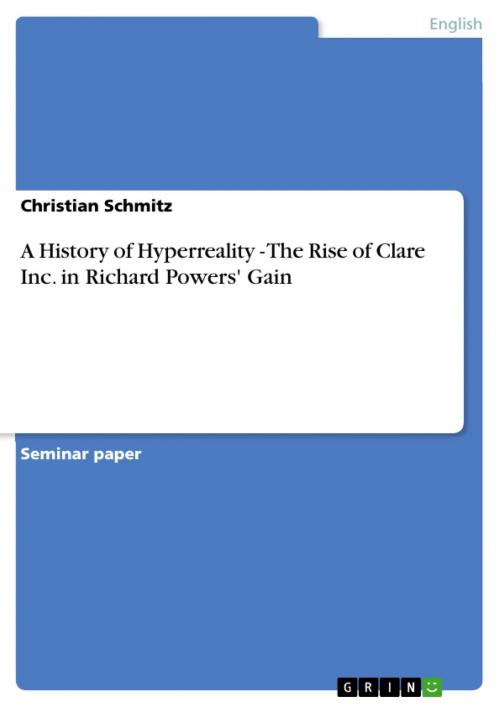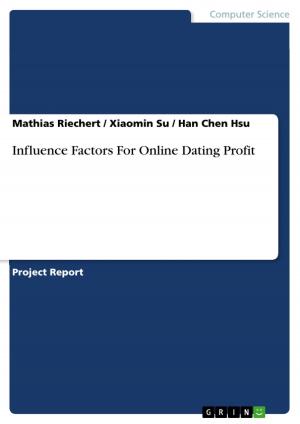A History of Hyperreality - The Rise of Clare Inc. in Richard Powers' Gain
The Rise of Clare Inc. in Richard Powers' Gain
Nonfiction, Entertainment, Drama, Anthologies| Author: | Christian Schmitz | ISBN: | 9783638562805 |
| Publisher: | GRIN Publishing | Publication: | October 30, 2006 |
| Imprint: | GRIN Publishing | Language: | English |
| Author: | Christian Schmitz |
| ISBN: | 9783638562805 |
| Publisher: | GRIN Publishing |
| Publication: | October 30, 2006 |
| Imprint: | GRIN Publishing |
| Language: | English |
Seminar paper from the year 2006 in the subject American Studies - Literature, grade: 1,0 (A), University of Dusseldorf 'Heinrich Heine', 17 entries in the bibliography, language: English, abstract: The first part of this paper will deal with the concept of hyperreality. As it would go beyond the scope of this paper to take into consideration everything that has been said and written about hyperreality, I will focus on two of its most prominent theorists: Jean Baudrillard and Umberto Eco. Their comments and ideas are not only relatively easy to grasp and therefore easy to apply to the novel but are also sufficient enough to explain the concept in adequate depth. The second part will then focus on the novel itself, to be more precise it will exclusively deal with the storyline of the Clare enterprise. Although the second storyline also provides a number of examples for hyperreality, I decided to leave it out as it only takes place in the present and therefore would disturb the linear concept of this paper. This part will apply the theories of hyperreality onto the novel step by step in chronological order of the events, starting with the beginnings of the enterprise and stating the problems of a referential beginning. It will then treat of the beginnings of hyperreality with regard to Clare and its accordant society and later with the process of incorporation and its problems; then I hope to show in how far simulation and merchandise are intertwined and almost naturally lead to the age of simulacra we live in today. Finally I want to point out that this paper is not a full scale interpretation of Gain but only deals with the concept and development of hyperreality within the novel.
Seminar paper from the year 2006 in the subject American Studies - Literature, grade: 1,0 (A), University of Dusseldorf 'Heinrich Heine', 17 entries in the bibliography, language: English, abstract: The first part of this paper will deal with the concept of hyperreality. As it would go beyond the scope of this paper to take into consideration everything that has been said and written about hyperreality, I will focus on two of its most prominent theorists: Jean Baudrillard and Umberto Eco. Their comments and ideas are not only relatively easy to grasp and therefore easy to apply to the novel but are also sufficient enough to explain the concept in adequate depth. The second part will then focus on the novel itself, to be more precise it will exclusively deal with the storyline of the Clare enterprise. Although the second storyline also provides a number of examples for hyperreality, I decided to leave it out as it only takes place in the present and therefore would disturb the linear concept of this paper. This part will apply the theories of hyperreality onto the novel step by step in chronological order of the events, starting with the beginnings of the enterprise and stating the problems of a referential beginning. It will then treat of the beginnings of hyperreality with regard to Clare and its accordant society and later with the process of incorporation and its problems; then I hope to show in how far simulation and merchandise are intertwined and almost naturally lead to the age of simulacra we live in today. Finally I want to point out that this paper is not a full scale interpretation of Gain but only deals with the concept and development of hyperreality within the novel.















